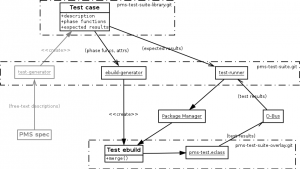The D-Bus communication method used now within PMS Test Suite shows more and more disadvantages over time. As the final evaluation’s approaching, it will be the final solution for the GSoC period of development. But after that I’ll probably jump straight to replacing it with something better.
Right now, I can list at least the following issues with my current IPC:
- it requires the system bus to be running which may not be really useful for smaller systems,
- …and which makes using it in a Prefix environment a painful experience,
- …and makes running multiple instances of pmsts a random failure,
- it limits the package to using Python 2, directly and indirectly (via GLib event loop),
- …and the GLib Python event loop fails to propagate exceptions correctly,
- …and it wants the PID out of subprocess.
Looking for a new solution
Before deciding which way to proceed, let’s take a look at what we exactly need to have. And we need:
- an IPC mechanism which would work fine within limited ebuild environment (sandbox, userpriv),
- …which would not require us to touch or prepare builddirs,
- …which would work fine with failing (or not even being started) ebuilds as well,
- and an event loop which would allow us to asynchronically communicate with ebuilds and wait for a single subprocess to finish,
- …and it all has to work both with Python 2 & 3.
And it would be great if I could avoid introducing additional dependencies.
asyncore?
Right now, the most promising solution seems to be using asyncore Python module, and an UNIX socket. Considering that gentoopm is already able to provide us with the userpriv UIDs for all PMs, we can make the socket userpriv-aware and not world-writable.
We’d use asyncore.loop() then to handle comms, and a few secs timeout to check the subprocess for termination.
One remaining question is the socket path. We could either:
- just make it a well-known name,
- make it random and write to the eclass at generation time,
- make it random and pass through the environment.
The first solution has the disadvantage that only one instance of PMS test suite could be running at once. On the other hand, running more than one at once seems to be a bad idea anyway (unless they’re running a completely different test suites with unique ebuild names and separate repos). By using a common socket name, the other instance could just ping the first one and fail nicely rather than failing quite randomly.
And the third solution has the big disadvantage that we’re starting to rely on a random variable getting passed through PM. Although this is possible and most probably even will work, I don’t think it’s a good idea. And it could stop working at any point.
I’ll probably go with the first one. I guess gentoopm would have to provide us with root path too.

